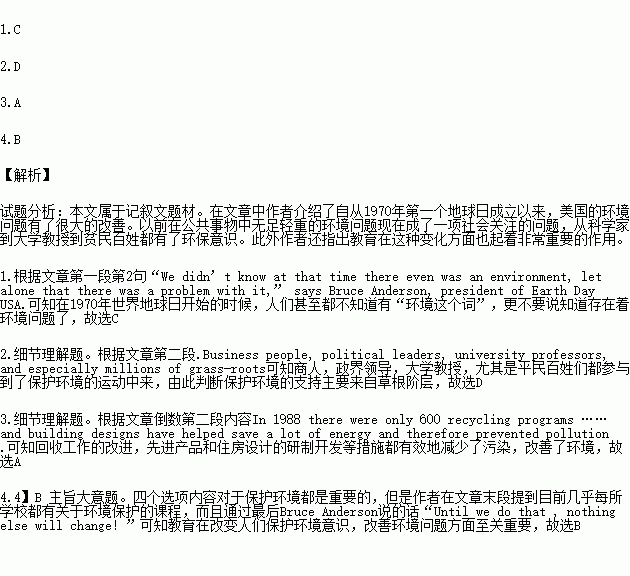题目内容
Since the first Earth Day in 1970, Americans have gotten a lot “greener” toward the environment . “We didn’t know at that time that there even was an environment, let alone that there was a problem with it, ”says Bruce Anderson, president of Earth Day USA.
But what began as nothing important in public affairs has grown into a social movement . Business people, political leaders, university professors, and especially millions of grass-roots Americans are taking part in the movement. “The understanding has increased many, many times, ”says Gaylord Nelson, the former governor from Wisconsin, who thought up the first Earth Day.
According to US government reports , emissions (排放) from cars and trucks have dropped from 10. 3 million tons a year to 5. 5 tons . The number of cities producing CO beyond the standard has been reduced from 40 to 9 . Although serious problems still remain and need to be dealt with , the world is a safer and healthier place . A kind of “Green thinking ” has become part of practices .
Great improvement has been achieved . In 1988 there were only 600 recycling programs , today in 1995 there are about 6, 600 . Advanced lights , motors , and building designs have helped save a lot of energy and therefore prevented pollution .
Twenty –five years ago , there were hardly any education programs for environment . Today , it’s hard to find a public school , university , or law school that does not have such a kind of program . ” Until we do that , nothing else will change! ” say Bruce Anderson .
1.According to Anderson , before 1970, Americans had little idea about ___
A. the social movement
B. recycling techniques
C. environmental problems
D. the importance of Earth Day
2. Where does the support for environmental protection mainly come from?
A. University professors
B. The business circle
C. Government officials
D. The grass –roots level
3.What have Americans achieved in environmental protection ?
A. They have reduced pollution through effective measures .
B. They have settled their environmental problems
C. They have lowered their CO levels in forty cities.
D. They have cut car emissions to the lowest
4.What is especially important for environmental protection according to the last paragraph ?
A. Planning B. Education
C. Green living D. CO reduction


